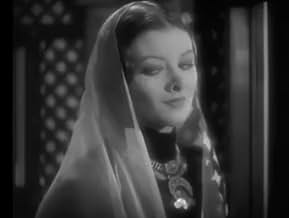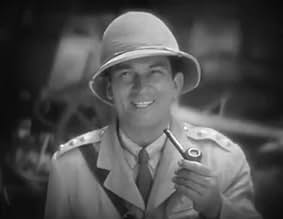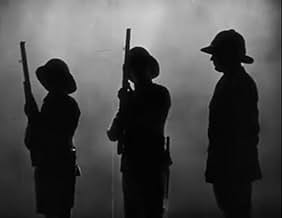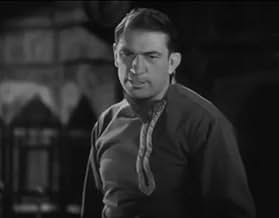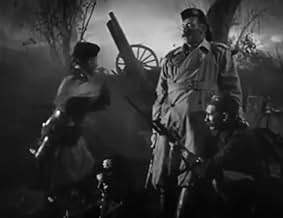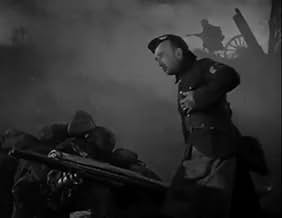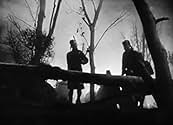Captain Donald King of the British Army goes to India just as World War I breaks out, convincing his comrades that he is a coward. In reality, he is on a secret mission to rescue British sol... Read allCaptain Donald King of the British Army goes to India just as World War I breaks out, convincing his comrades that he is a coward. In reality, he is on a secret mission to rescue British soldiers held prisoner there.Captain Donald King of the British Army goes to India just as World War I breaks out, convincing his comrades that he is a coward. In reality, he is on a secret mission to rescue British soldiers held prisoner there.
- Director
- Writers
- Stars
Claude King
- General in India
- (as Claud King)
Harry Allen
- Sandy
- (uncredited)
Frank Baker
- 42nd Highlander
- (uncredited)
William Begg
- 42nd Highlander
- (uncredited)
Arthur Clayton
- 42nd Highlander
- (uncredited)
Joseph Diskay
- Muezzin
- (uncredited)
Francis Ford
- Maj. MacGregor
- (uncredited)
Gregory Gaye
- 42nd Highlander
- (uncredited)
- Director
- Writers
- All cast & crew
- Production, box office & more at IMDbPro
Featured reviews
John Ford had notched up almost 50 films in the director's chair when he took on this project in the late 20's coinciding with the advent of sound.
Far less well known than its 1953 re-make (known AS KING OF THE KHYBER RIFLES) with Tyrone Power in the Victor McLlaglen role, the story is that of British Army Officer Captain King, who encounters way more than he expected when he is asked to put down an Indian rebellion up around the Khyber Pass.
Very dated now and without the benefit of wide screen color which so enhances desert dramas especially, BLACK WATCH is still an interesting time-capsule. I saw it many years ago on late night TV, both to compare with the later version and to see how John Ford's direction held up in 1929. On both counts, the film scored well!
Far less well known than its 1953 re-make (known AS KING OF THE KHYBER RIFLES) with Tyrone Power in the Victor McLlaglen role, the story is that of British Army Officer Captain King, who encounters way more than he expected when he is asked to put down an Indian rebellion up around the Khyber Pass.
Very dated now and without the benefit of wide screen color which so enhances desert dramas especially, BLACK WATCH is still an interesting time-capsule. I saw it many years ago on late night TV, both to compare with the later version and to see how John Ford's direction held up in 1929. On both counts, the film scored well!
Is it because it's the beginning of the talkies that both McLaglen's and Myrna Loy's playing are almost ridiculous ?One should forgive the actress for her part of an Indian Joan Of Ark -but a maid who is fond of men,we are told- is not exactly what you call the part of her life.All that takes place in a pasteboard India looks like a poor man's "lifes of a Bengal Lancer"(which would appear six years later):even two names (Mohammed Khan and McGregor) are used in both movies.
On the other hand ,all that takes place in Scotland shows John Ford's touch :the manly camaraderie, the brothers in arm singing "Auld Lang Syne" before leaving for France (WW1),the officer wrongly accused of cowardice -his superior warns him:"you will be a pariah"-;and more prosaically ,the missus ' piece of advice to the private about his privates and the soldier confessing later that at least at war he was left alone.
The scene of the crystal ball almost predates the one in Mankiewicz's "Cleopatra" when Julius Cesar is murdered.
On the other hand ,all that takes place in Scotland shows John Ford's touch :the manly camaraderie, the brothers in arm singing "Auld Lang Syne" before leaving for France (WW1),the officer wrongly accused of cowardice -his superior warns him:"you will be a pariah"-;and more prosaically ,the missus ' piece of advice to the private about his privates and the soldier confessing later that at least at war he was left alone.
The scene of the crystal ball almost predates the one in Mankiewicz's "Cleopatra" when Julius Cesar is murdered.
Released in 1929, THE BLACK WATCH is an entertaining flick shot in black & white, and John Ford's first all-talkie film. It's based on the 1916 novel 'King of the Khyber Rifles' by Talbot Mundy.
Captain Donald King (McLaglen) goes undercover and leaves his regiment (Black Watch) to put down a rebellion in India at the at the start of WWI. There he finds the beautiful princess Yasmani (Loy) who plans to send her minions to attack British forces at the Khyber Pass.
As we would expect from a Ford movie it has a good look, especially the outdoor scenes. The Cave of Echoes scenes are well crafted with fine visuals and sound effects.
The problem the movie has is it's dialogue in many scenes, Myrna Loy's in particular, is stilted and stagy , as if they thought the mics couldn't keep up with their voices. Still, a good movie.
Captain Donald King (McLaglen) goes undercover and leaves his regiment (Black Watch) to put down a rebellion in India at the at the start of WWI. There he finds the beautiful princess Yasmani (Loy) who plans to send her minions to attack British forces at the Khyber Pass.
As we would expect from a Ford movie it has a good look, especially the outdoor scenes. The Cave of Echoes scenes are well crafted with fine visuals and sound effects.
The problem the movie has is it's dialogue in many scenes, Myrna Loy's in particular, is stilted and stagy , as if they thought the mics couldn't keep up with their voices. Still, a good movie.
By 1929 standards, "The Black Watch" is a decent film. When seen today, however, it seems very stilted and slow. But you cannot fault the movie for being so static and stagey, as in 1929 filmmakers were still struggling to integrate sound into movies...and it took them another year or two to get it right. In this case, it was the first sound film of John Ford...and it shows.
When the story begins, the officers of a Scottish Highlands regiment are having a party and toasting to their success in WWI...which has just begun. They see it as a chance for glory and fun and all that rot, but John Ford filmed this section with great sentimentality...as if to glorify the godawful mess that the war would soon become.
During this party, Captain Donald Gordon King (Victor McLaglen) is called to talk to his commander. He's ordered to go to India for an undercover mission instead of just getting his head blown off in France with his friends. And, because the film shows such patriotism and gung ho attitudes, Donald is sad to not get into the action!
Once in India, he's expected to insinuate himself into the inner circle around a strange and charismatic woman named Yasmani (Mynra Loy) who is plotting a rebellion in British India. To do this, he is publicly disgraced and runs to Yasmani's camp...hoping that she and her men won't realize the whole disgraced thing is a sham. What's next? See the film and find out for yourself.
Technically, this is a very good film. The cinematography is exceptional and the sound for 1929 is excellent. The sets also are pretty amazing.
On the other hand, the film has a few deficits. None of the 'Indians' in the movie look the least bit Indian...with the likes of Walter Long and Myrna Loy playing natives!! Such silly casting wasn't unusual back in the day and Hollywood was still trying to figure out what to do with Loy...even casting her as a Chinese lady in "The Mask of Fu Manchu" only a few years later. In addition, although the sound quality is good, the acting combined with the sound isn't so hot. It's incredibly stilted and the acting stagy as well...not unusual for 1929 but obvious by the standards even of 1930-1932. Some scenes look as if they were from a silent movie, stylistically speaking. This is especially true when the Captain was pitching woo with Yasmani....the acting of both (particularly Loy) was truly awful!! As a result, the scope and excitement that should be in the story are sadly lacking at times. Overall, well worth seeing but probably a bit of a disappointment for Ford fans. My score of 4 might seem a bit high, but it is watchable and I tend to cut the films of 1927-29 some slack because of changing technologies and styles.
When the story begins, the officers of a Scottish Highlands regiment are having a party and toasting to their success in WWI...which has just begun. They see it as a chance for glory and fun and all that rot, but John Ford filmed this section with great sentimentality...as if to glorify the godawful mess that the war would soon become.
During this party, Captain Donald Gordon King (Victor McLaglen) is called to talk to his commander. He's ordered to go to India for an undercover mission instead of just getting his head blown off in France with his friends. And, because the film shows such patriotism and gung ho attitudes, Donald is sad to not get into the action!
Once in India, he's expected to insinuate himself into the inner circle around a strange and charismatic woman named Yasmani (Mynra Loy) who is plotting a rebellion in British India. To do this, he is publicly disgraced and runs to Yasmani's camp...hoping that she and her men won't realize the whole disgraced thing is a sham. What's next? See the film and find out for yourself.
Technically, this is a very good film. The cinematography is exceptional and the sound for 1929 is excellent. The sets also are pretty amazing.
On the other hand, the film has a few deficits. None of the 'Indians' in the movie look the least bit Indian...with the likes of Walter Long and Myrna Loy playing natives!! Such silly casting wasn't unusual back in the day and Hollywood was still trying to figure out what to do with Loy...even casting her as a Chinese lady in "The Mask of Fu Manchu" only a few years later. In addition, although the sound quality is good, the acting combined with the sound isn't so hot. It's incredibly stilted and the acting stagy as well...not unusual for 1929 but obvious by the standards even of 1930-1932. Some scenes look as if they were from a silent movie, stylistically speaking. This is especially true when the Captain was pitching woo with Yasmani....the acting of both (particularly Loy) was truly awful!! As a result, the scope and excitement that should be in the story are sadly lacking at times. Overall, well worth seeing but probably a bit of a disappointment for Ford fans. My score of 4 might seem a bit high, but it is watchable and I tend to cut the films of 1927-29 some slack because of changing technologies and styles.
Victor McLaglen stars as Captain Donald King, a member of a Scots regiment of His Majesty's Armed Forces during WW1. While his company receives orders to ship out to the front, King is given a different assignment, He is to go undercover to India, where he will pretend to be a drunk who gets chased out of the service so that he can infiltrate a gang of Muslim rebels who worship a woman named Yasmani (Myrna Loy) as a goddess. Naturally things get further complicated when King falls for Yasmani. Also featuring Randolph Scott and John Wayne as extras.
This was director Ford's first sound movie, and it shows. For the first 45 minutes or so, I was prepared to call this one a complete turkey, just horrible in nearly every way, but by the end I thought pretty much the same thing, except it plunged into pure camp, and Ford manages to shoot some visually interesting shots when the action moves to "The Cave of the Echoes". McLaglen and Loy are awful, and you would never know from this that either would be capable of acting their way out of a paper bag.
Ford certainly hadn't grasped sound acting, and virtually everyone is terrible, drawing lines out to ludicrous length and over emoting like the worst silent film ham. Loy looks great, and she has a lengthy scene in a white, virtually see-through shirt. I was left wondering what kind of East Indian Muslims also worshiped random white ladies as goddesses, but that train of thought led nowhere. The fiery, shadowy Cave interiors are atmospheric, and the scene where McLaglen is "forced" to wrestle the Muslim champion is amusing, as I would think it was harder to stop Victor McLaglen from wrestling random guys on the set every day. 5/10 on its merit as a dramatic film, 7/10 on a so good it's bad scale, I split the difference.
This was director Ford's first sound movie, and it shows. For the first 45 minutes or so, I was prepared to call this one a complete turkey, just horrible in nearly every way, but by the end I thought pretty much the same thing, except it plunged into pure camp, and Ford manages to shoot some visually interesting shots when the action moves to "The Cave of the Echoes". McLaglen and Loy are awful, and you would never know from this that either would be capable of acting their way out of a paper bag.
Ford certainly hadn't grasped sound acting, and virtually everyone is terrible, drawing lines out to ludicrous length and over emoting like the worst silent film ham. Loy looks great, and she has a lengthy scene in a white, virtually see-through shirt. I was left wondering what kind of East Indian Muslims also worshiped random white ladies as goddesses, but that train of thought led nowhere. The fiery, shadowy Cave interiors are atmospheric, and the scene where McLaglen is "forced" to wrestle the Muslim champion is amusing, as I would think it was harder to stop Victor McLaglen from wrestling random guys on the set every day. 5/10 on its merit as a dramatic film, 7/10 on a so good it's bad scale, I split the difference.
Did you know
- Quotes
General in India: Forget your schoolboy scruples. This is war.
- ConnectionsFeatured in Hollywood (1980)
- How long is The Black Watch?Powered by Alexa
Details
- Release date
- Country of origin
- Language
- Also known as
- King of the Khyber Rifles
- Production company
- See more company credits at IMDbPro
Box office
- Budget
- $400,000 (estimated)
- Runtime1 hour 33 minutes
- Color
Contribute to this page
Suggest an edit or add missing content


